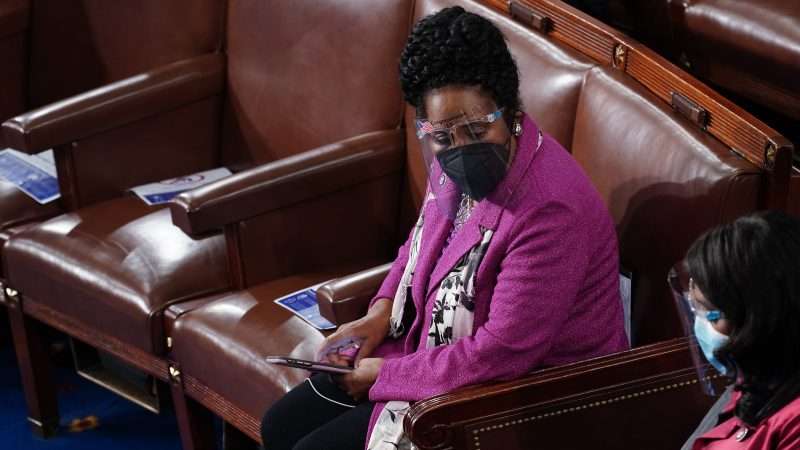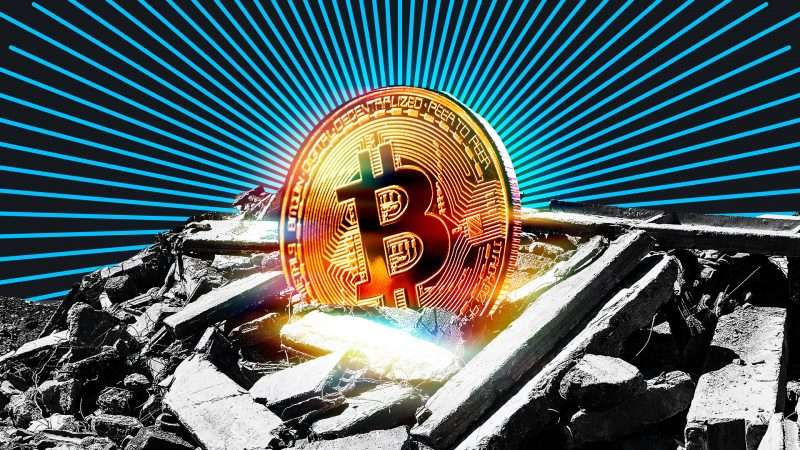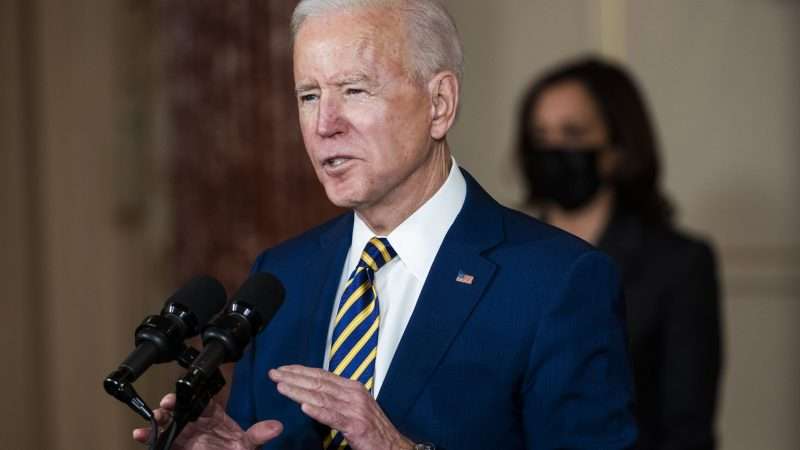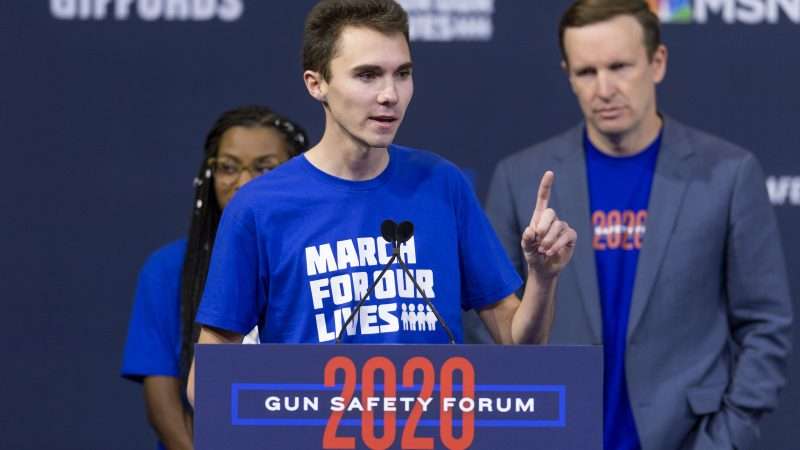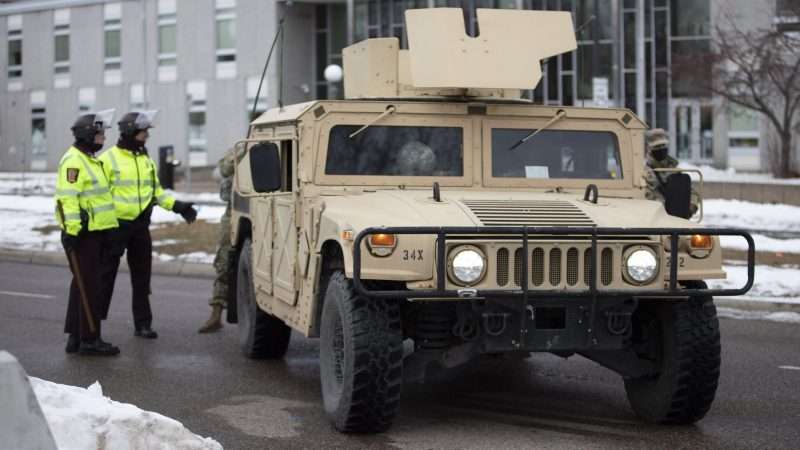A gun control bill that Rep. Sheila Jackson Lee (D–Texas) recently introduced gives you an idea of what Democrats might do if they did not have to worry about the Second Amendment. The Sabika Sheikh Firearm Licensing and Registration Act would establish a national database that is supposed to include every gun in the country, make it a felony to own a firearm or ammunition without a license from the Justice Department, ban magazines that hold more than 10 rounds and “ammunition that is 0.50 caliber or greater,” and criminalize possession of a “military-style weapon” without a special license. Violating the bill’s provisions would be punishable by hefty fines and long minimum prison sentences, which Lee ordinarily claims to oppose.
The registration requirement applies to both currently owned firearms and guns purchased after the bill takes effect. The bill would give current owners three months to report “the make, model, and serial number of the firearm, the identity of the owner of the firearm, the date the firearm was acquired by the owner, and where the firearm is or will be stored” as well as “the identity of any person to whom, and any period of time during which, the firearm will be loaned to the person.” New buyers would have to report that information on the date of purchase. Failure to comply would be punishable by a minimum fine of $75,000, a minimum prison sentence of 15 years, or both.
Licenses would be limited to people 21 or older who pass a criminal background check, undergo a “psychological examination,” complete at least 24 hours of training, and pay an $800 “fee” for liability insurance. The examination, which may include assessing “other members of the household in which the individual resides,” would be conducted by a government-approved psychologist charged with determining whether the applicant is “psychologically unsuited to possess a firearm.”
The psychologist would be required to interview “any spouse of the individual, any former spouse of the individual, and at least 2 other persons who are a member of the family of, or an associate of, the individual to further determine the state of the mental, emotional, and relational stability of the individual in relation to firearms.” Denial of a license would be mandatory if the applicant has ever been “hospitalized” because of “conduct that endangers self or others,” a “brain disease” such as “dementia or Alzheimer’s,” or a “mental illness, disturbance, or diagnosis,” including (but not necessarily limited to) depression, homicidal ideation, suicidal ideation, attempted suicide, and addiction to a controlled substance or alcohol.
That disqualification goes far beyond the psychiatric restrictions that federal law currently imposes on gun ownership, which are already overly broad but apply only to people who have undergone court-ordered treatment. Lee is saying that anyone who has ever been treated in a hospital for any of these conditions, whether voluntarily or involuntarily, should never be allowed to own a gun, no matter how long ago it was and regardless of his current mental state.
In addition to those mandatory disqualifications, the attorney general “may” deny a gun license to someone who “has a chronic mental illness or disturbance, or a brain disease,” is addicted to drugs or alcohol, has attempted suicide, or has “engaged in conduct that posed a danger to self or others,” as determined by “prior psychological treatment or evaluation.” That casts the net even wider, since it includes people who were never hospitalized for these reasons and leaves open the question of how the government determines that someone is “addicted” or has a “mental illness or disturbance.” According to some estimates, nearly half of Americans qualify for a psychiatric diagnosis at some point in their lives, which gives you a sense of how expansively “mental illness” is defined but is hardly a sound basis for denying people their Second Amendment rights.
If an applicant does not survive this gauntlet, it would be a felony for him to possess a firearm, punishable by the same fines and prison sentences as failure to register. That applies to current owners as well as new buyers. People who have been licensed for less than five years would have to renew their licenses every year; people who have been licensed five years or longer would be eligible for three-year licenses. If a gun owner neglects to renew his license, he would be subject to the same fines and prison time as someone who never got a license.
Lee lists a bunch of specific models that qualify as “military-style weapons,” a.k.a “assault weapons.” The definition also includes semi-automatic rifles that accept detachable magazines and have two or more of these features: “a folding or telescoping stock,” “a pistol grip that protrudes conspicuously beneath the action of the weapon,” a “bayonet mount,” a “flash suppressor or threaded barrel designed to accommodate a flash suppressor,” or a “grenade launcher.”
That last feature is not much use without grenades, which are banned as “destructive devices” under federal law, and the rest have nothing to do with rate of fire, muzzle velocity, or ammunition caliber. A rifle without these features is just as lethal as a rifle with them. Lee nevertheless wants to require a special license for “military-style weapons,” requiring completion of “a training course, certified by the Attorney General, in the use, safety, and storage of the weapon, that includes at least 24 hours of training and live fire training.” Except for specifying “live fire training,” this is the same as the requirement for a standard gun license. The main point seems to be identifying owners of “military-style weapons,” in case Congress later decides to ban them.
Lee is not waiting to ban large-caliber ammunition and magazines that hold more than 10 rounds, which are standard for many popular handguns and rifles. Possessing the former would be punishable by a minimum fine of $50,000, a minimum prison term of 10 years, or both. Possessing the latter would be punishable by a minimum fine of $10,000, at least a year in prison, or both.
Any gun possessed by someone who has failed to register it or does not have a current federal license likewise would be subject to confiscation. That person could then be prosecuted and sent to prison for at least 15 years.
These are odd prescriptions for an avowed critic of mandatory minimums to offer. Here is what Lee said when she introduced a sentencing reform bill in 2015:
We come together today armed not only with the knowledge that our criminal justice system is deeply flawed, but with the commitment to fix these flaws. The cost of this system is incredibly high, not just in dollars spent, but also in dollars lost. Every person taken out of a community and placed into a prison is a person who cannot contribute to a family, a community, and our society. Worse, this system takes an incredible human toll, with the cycle of incarceration in a constant state of destruction. Today, with this legislation, we unify to reject a system that is often more effective at creating criminals and collateral damage than actual justice.
Yet Lee now wants to transform millions of Americans into felons, threatening them with long prison terms for peaceful conduct that violates no one’s rights. A clearer example of how readily partisans forsake their supposed principles when they prove inconvenient is hard to imagine.
Lee’s bill is named after Sabika Sheikh, a foreign exchange student from Pakistan who was murdered in the 2018 mass shooting at Santa Fe High School in Texas. The perpetrator of that attack was 17, meaning it was already illegal for him to possess the .38-caliber revolver he used (except for temporary possession in specified circumstances, such as hunting or target shooting). In addition to the revolver, he had a 12-gauge shotgun. Neither would qualify as a “military-style weapon” under Lee’s bill. In other words, her legislation has nothing to do with the crime she invokes to justify it, which is par for the course with anti-gun politicians.
The system Lee imagines is completely impractical, since gun owners would be understandably reluctant to identify themselves and their firearms so they could be entered in a federal database and required to apply for licenses. Politicians pursuing far less ambitious gun registration schemes have found that voluntary compliance is the exception rather than the rule. Since the Justice Department would not have the resources to go after millions of recalcitrant gun owners even if it knew who they were, the result would be random application of Lee’s draconian penalties to the few who happened to attract the government’s attention.
Who would those people tend to be? As a legislator who decries racial bias in policing, Lee ought to know. Current restrictions on gun ownership already disproportionately hurt African Americans, who are more likely than whites to have felony records that permanently bar them from possessing firearms for self-defense, no matter the nature of the offense or how long ago it happened. Lee’s bill would only compound that problem. Call that what you want, but it is manifestly not an attempt to fix a “deeply flawed” criminal justice system that is “often more effective at creating criminals and collateral damage than actual justice.”
It should go without saying that violent criminals will be even less motivated to comply with Lee’s requirements than the average gun owner. They already obtain, possess, and use guns illegally. They will not be fazed by another layer of criminality.
Lee’s bill so far has no cosponsors, and it is unlikely to make much progress. But it reflects a broader mindset in the Democratic Party, which used to at least pay lip service to the Second Amendment but lately talks and acts as if it does not exist. After promising to respect the Second Amendment in 2004, 2008, and 2012, the Democrats erased the constitutional provision from their 2016 platform, although they did mention “the rights of responsible gun owners.” The 2020 platform omitted even that phrase.
President Joe Biden does occasionally mention the Second Amendment, which he says he respects. “It’s within our grasp to end our gun violence epidemic and respect the Second Amendment, which is limited,” his campaign website said. How limited?
We know that Biden’s Second Amendment does not cover guns he does not like. He concedes that the federal ban on “assault weapons,” which was part of what he has proudly called “the 1994 Biden Crime Bill” but expired in 2004, had no impact on the lethality of legal firearms. Yet he supports a new and supposedly improved version, including a magazine ban similar to Lee’s and a requirement that current owners of the targeted firearms either surrender them to the government or follow the same tax and registration requirements that apply to machine guns.
During an argument with a Detroit autoworker last year, Biden suggested that the Second Amendment no more protects the right to own “assault weapons” than the First Amendment protects the right to falsely cry “Fire!” in a crowded theater. And although the Supreme Court has described handguns as “the quintessential self-defense weapon,” possession of which for home protection is indisputably protected by the Constitution, Biden thinks shotguns are better for that purpose. While Biden has not said his preference should be enforced by law, his policy prescriptions might be different if the Court had not ruled so clearly on the issue. His explanation of why he is willing to let people own guns, which focuses on hunting rather than self-defense, does not inspire much confidence that his avowed respect for the Second Amendment is based on a clear understanding of its function.
Proposals like Lee’s help make Biden’s gun control agenda look moderate and reasonable by comparison. But his attitude, like hers, shows that Democrats would be perfectly happy to expurgate the Bill of Rights if only the courts would let them.
from Latest – Reason.com https://ift.tt/3jlMRj7
via IFTTT
